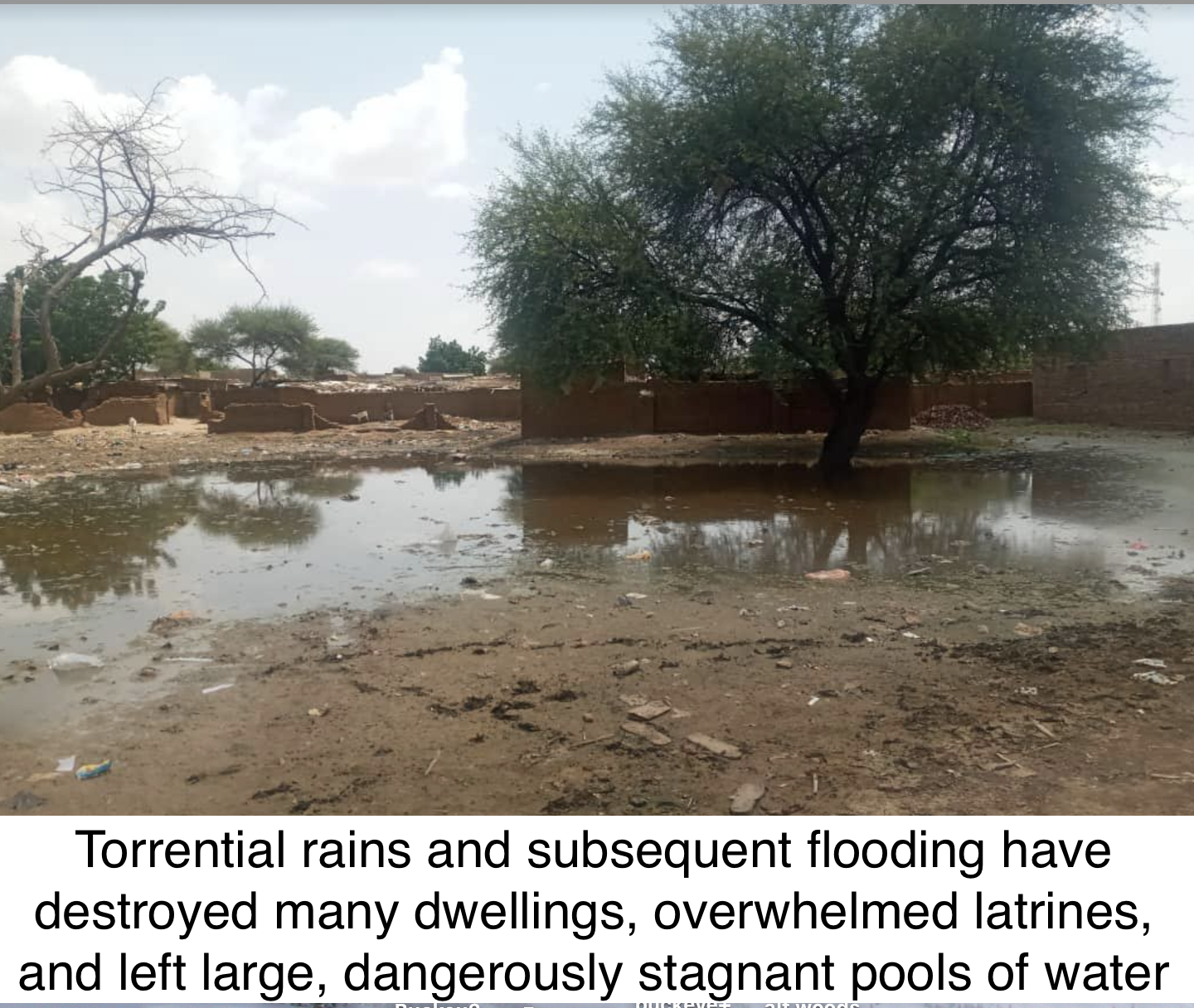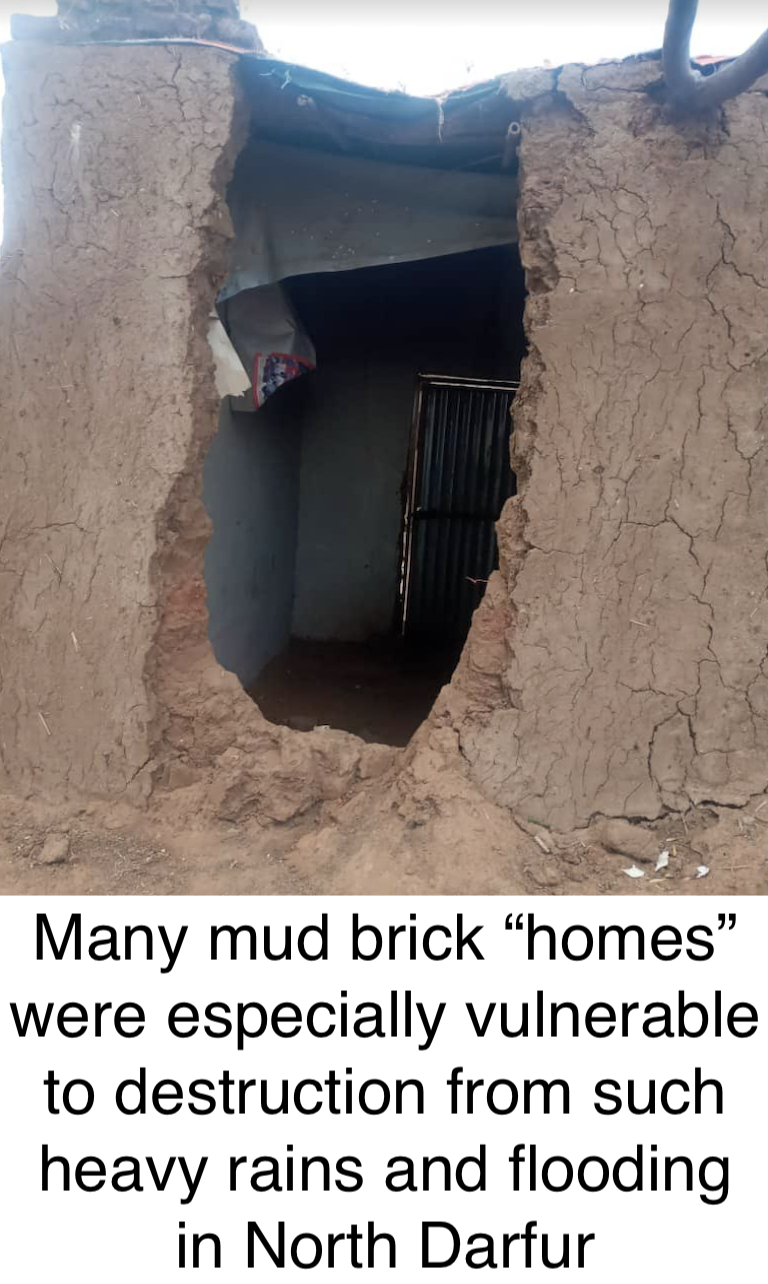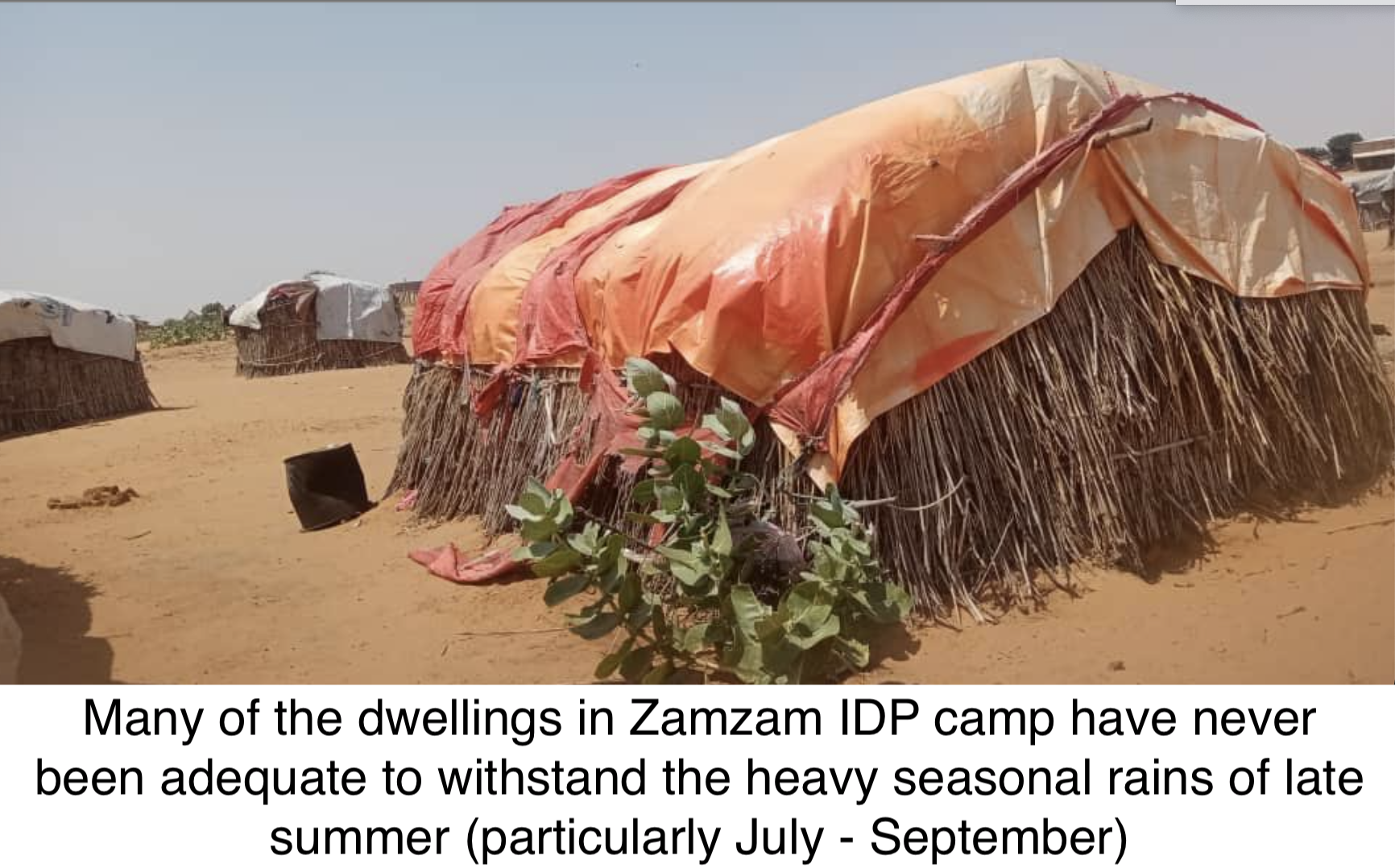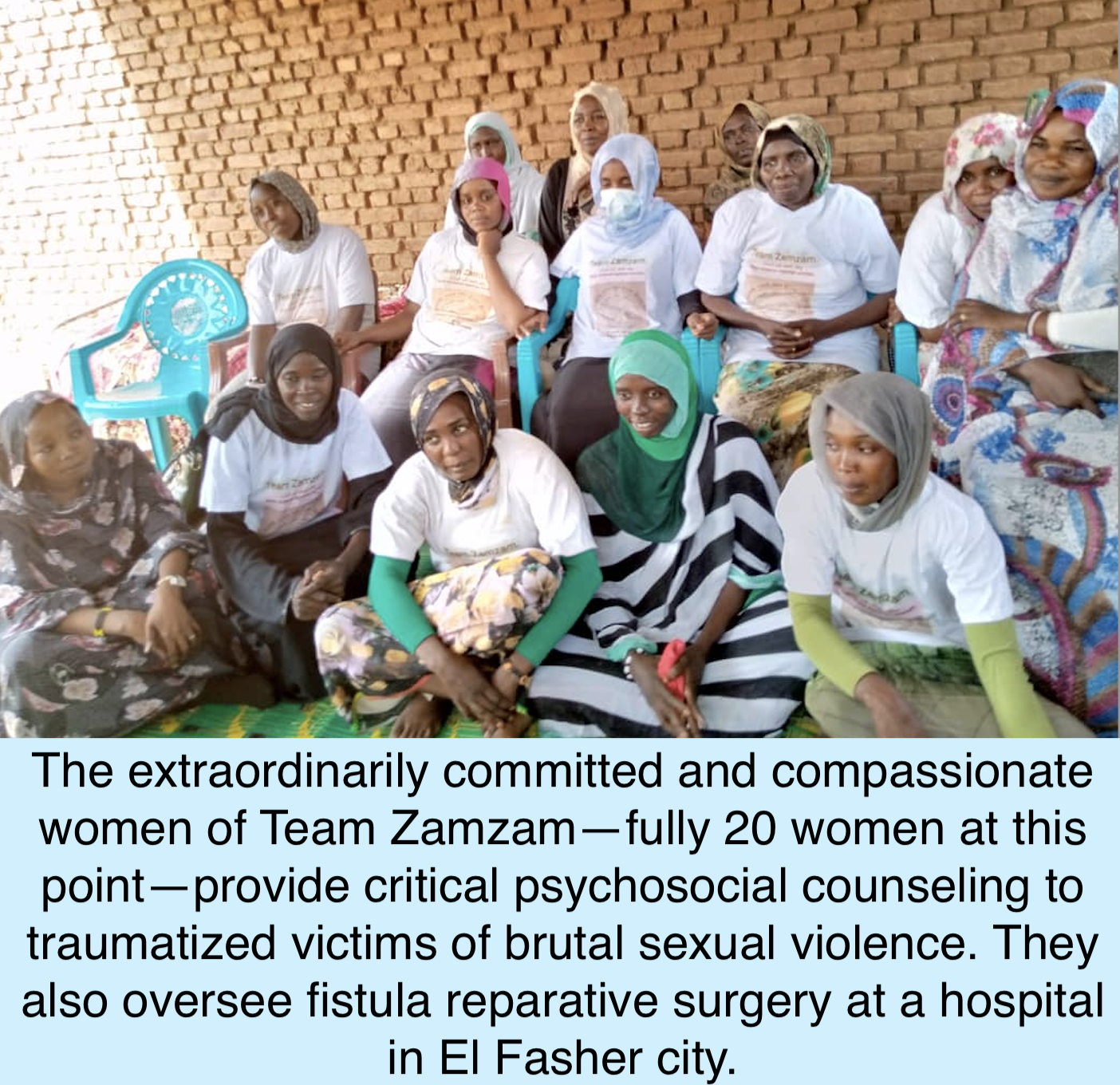ANNEX: Project Update, October 25, 2022: Responding to Sexual Violence in Darfur
From the coordinating counsellor of Team Zamzam (translated by Gaffar Mohammud Saeneen)
October 2022 update by the Coordinating Counselor of Team Zamzam (received October 25, 2022)
For this month, my focus will be on the victims of the recent disastrous floods in North Darfur and to highlight current living conditions for residents of Zamzam IDP camp. These displaced persons are struggling to cope with the terrible impact of repeated attacks and kidnappings of farmers by armed nomadic Arabs groups; these groups have repeatedly and intentionally loosed their livestock on civilian farms as a means of ruining the harvest, thereby exacerbating the critical food insecurity.
The third part of this update honours two exceptional women from Zamzam camp, as well as the camp activists and women leaders who highlight the daily struggles of girls and women by giving voice to them in their own words.
The tragedy of late autumn rains in North Darfur and daily struggles and suffering of so many families in Zamzam camp
In late August of this year, heavy rains fell in North Darfur, which affected more than 4,000 families in Zamzam camp alone, according to the state government’s estimates. But the real numbers are several times greater than those offered by local and regional authorities. The torrents and floods that struck North Darfur state completely destroyed several thousand fragile houses built of fruit leaves and left thousands of families and children naked. And despite the passage of nearly two months, almost two-thirds of the people of Zamzam camp are still languishing under damaged tents. Urgent relief appeals launched by local charities to help those affected have been unanswered, and little is being done to help those who are living under such damaged “homes” in places like Zamzam.
During a recent field visit made by Team Zamzam, one Sheik described the situation as follows:
“Many homes fell over because of torrential rains and subsequent flooding. In large parts of the camp houses were completely wiped out. People are living in their yards and under torn tents. There is barely room to stand; there are no bathrooms and as many as twenty families share a latrine, which generates the spread of parasites, bacteria, and other microbes. On the streets, many people with chronic diseases such as diabetes are suffering a great deal; pregnant women are also suffering.
“People in Zamzam are now dealing with yet another debilitating psychological problem, as people feel imprisoned inside the camp because of ongoing Janjaweed threats. People simply cannot go out of Zamzam to fetch cooking firewood, and their lives are lived under crumpled houses.”
For its part, the Sudanese government—as represented by local officials—has not fulfilled even a minimum of its obligations to these suffering people; they, in turn, no longer expect anything. But they are still appealing to local charities and international organizations, as the health situation of children is deteriorating rapidly. Currently, one INGO in Zamzam camp, Doctors Without Borders/Médecins Sans Frontières (MSF), is doing a great job day and night. But given the vast size of the camp population and the present challenges, more humanitarian organizations are needed on the ground.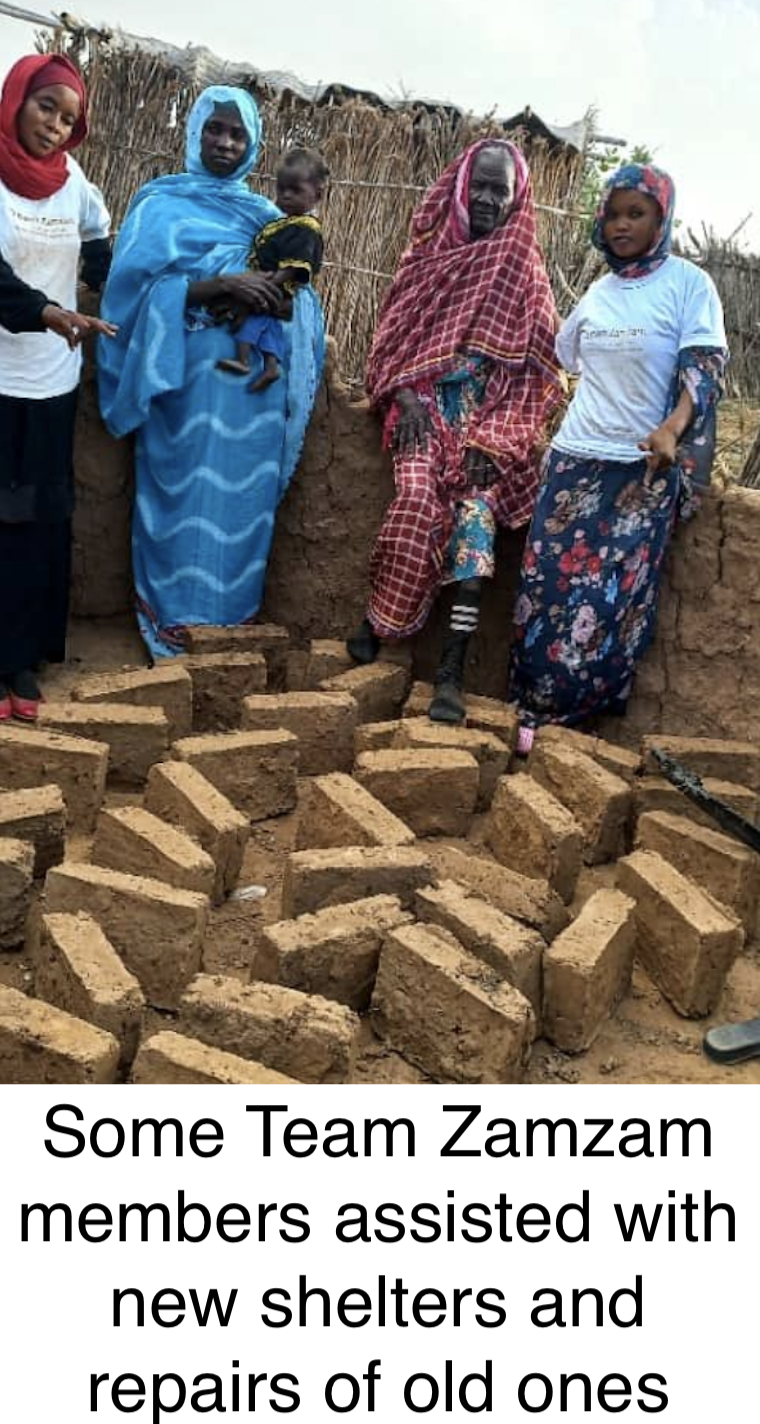
Deliberate sabotage of the harvest season at gunpoint
Violence continues to define this agricultural season: there are repeated kidnappings of people on their farms at gunpoint, with the effect of deliberately ruining this year’s harvest; meanwhile the state governor is silent. This year, unlike preceding years, the overwhelming majority of people of North Darfur, in particular people of Zamzam camp, simply did not attempt to farm, given the threats posed by armed militias, which roam around the areas north and east of Jebel Marra. A small number of families did attempt to farm, but they too are now facing threats from the same heavily armed Arab militias; these are the same militia forces that only few months earlier unleashed a campaign of terror, chaos, and mass displacement.
During the past two weeks, many from this area have complained about the security threats, intimidation, and actual violence; they have made several appeals to the local government for urgent intervention to protect the harvest season. And yet still no effective action has been taken. Ahmed Khater, a survivor of the recent attacks said:
“In the past two weeks we have suffered a lot from severe beatings. The militias unleash their livestock on our farms while we are collecting the small quantity of food from this harvest; and if we object, they come around in groups to whip us, insulting everyone who dares to open his mouth. Two of my cousins were kidnapped from their farm for two days and now they both are on the bed suffering from severe beatings and bleeding.”
Moreover, Sheikh Abdul Shafi Ibrahim—one of the sheikhs of Zamzam camp—stated that the state government is not only completely incapable of providing security for citizens, but is actually a major partner in the ongoing violent crimes against the people they are supposed to protect. “If you file a complaint with the police or any local authorities about an injustice or crimes by the Janjaweed, they just ignore your file; and if you insist on following up, you end up being assaulted or threatened with imprisonment,” Sheikh Ibrahim said. “Why should we not think of the local authorities as accomplices in what is happening here in Darfur?”
The heroines of Zamzam camp
In Sudan, and especially in Darfur—where so many men have been killed or gone missing—women constitute a significant majority of the population. But despite this fact, their role in decision-making circles, even at the local level, is minimized to such an extent that it is almost invisible. Women in Sudan have played pivotal roles at all important historical junctures and continue to play an essential role in every phase of the many and long conflicts. Women have proved their worth in times of difficulty and today in Sudan, especially those women who live in the peripheral areas, are of particular value and importance. Women in Sudan are not only a cornerstone in every part of life but the backbone of a society that has nonetheless failed to appreciate their efforts. This is so despite the fact that women are the ones who do most of the hard work, from farming to brick-making, and other tasks.
Despite their importance, today in rural Darfur women suffer from excessive violence, in all forms. on a daily basis. They also bear the brunt of a severe shortage in basic necessities. Their voices are deliberately being suppressed as they are shackled by the constraints of perversely outdated traditions. This must be seen in the context of “religious merchants” who view women exclusively through the lens of worldly pleasure.
Despite these daily challenges, miseries, and psychological pressures, the rural Darfuri women have found ways to survive by means of a resistance that runs deep onto their blood. The rural Darfuri women are more certain than ever that human dignity is the only thing that cannot be bought from anyone, but rather must be obtained through continuous struggle. The cumulative effects of social oppression based on gender inequality and economic marginalization in Sudan has had a huge negative impact on the progress of women throughout Sudan. But the greatest impact has been at the rural level, and it is the rural women of Darfur who are struggling with greatest difficulty to make daily ends meet.
These emotional scars and denial of their most fundamental rights have only increased their capacity of endurance—they have strengthened their minds and their determination to obtain their God-given rights by all possible means—with profound perseverance, dedication, and an attitude of never giving up. To understand how these marginalized women of Darfur are managing to survive on a day to day basis, we ought to listen to their respective personal experiences and stories, narrated in their own words. Hence the focus of this month on the women of Zamzam.
Story of struggler from Zamzam
Noura Ali Adam is 36 years old and from Shouba village in Tawila locality. She has been living in Zamzam camp for several years. She is a widow and mother of three daughters and four sons, all of whom are under the age of 13. In the past six years, Noura has worked in various jobs, from cleaning houses, washing clothes, cleaning restaurants, and working as a street vendor in El Fasher city; she now works as a tea vendor (in Sudan, they are known as “tea ladies”) in one of the local markets, trying to provide for her children.
She said: “I fled to this camp about fifteen years ago when I was in my early twenties after attacks on my village in which I lost many members of my dear family and friends.”
Noura did not get an education, even a basic education, because of the continuing superstitious belief forbidding girls from receiving an education. In later years, however, she made an effort to teach herself to read and write.
Noura said: “Life in the countryside before the war was so wonderful that we always yearn for it in our dreams, because everything was normal and food was plenty. But today life in these camps has worsened and everything has changed, even people’s morals.”
Moreover, she continued saying:
“Life was not that difficult before the war, but then things became unbearable for everyone around here. You know every day of the week except Friday I get up before dawn prayer, leave my kids behind at five in the morning and walk for about an hour until I reach the market to prepare breakfast tea before the traders as they opens their shops; and yet at the end of the day, what one gets isn’t even enough to buy sufficient nutritional food for the next day. You know when you are a woman, because here in Darfur there are too many hustlers in the street and each one of them wants their piece of pie from our hard-earned tea money. The police want to be paid for allowing us to work, other people from the government tax-office want something, including daily rent for my place of work. The rest of my money goes for the cost of water, sugar, and tea. This is how we survive day to day: there aren’t any other options available to me.”
For Noura, despite her fond memories of her village and dreams of those better days gone by, the very notion of returning back to those burned villages not only deepens her scars and brings back horrible flashbacks in which she and her family suffered from those heinous attacks. When she was asked if she could recall some of those events which changed her life so painfully and suddenly, she paused for a moment silently and tears fell from her eyes.
After wiping off her tears with her light-green headscarf, she apologised for succumbing to her emotions and said: “When one remembers the loved one and one’s dearest, it’s almost difficult to control my emotions.” In those heinous attacks on her village years ago, she lost her father, two of her brothers, her first husband, seven of her uncles, four cousins, some distant relatives, and her best childhood friend. But the worst came ten years later in 2017 when her second husband was shot dead before her eyes by Janjaweed who then immediately proceeded to rape her 14-year-old daughter.
Until 2017, Noura used to go every rainy season with her family to farm in the area east Tawila; but the horrific events of 2017—the killing of her husband and the rape of her young daughter—made her change her mind completely. She rejected completely the idea of depending on agriculture and instead focused on achieving her livelihood through various marginal jobs, often with very little income.
She said that she loves agriculture a lot and she thinks relying on it would ease the cost of living for her family; but what happened to them forced her to give up on the idea of leaving Zamzam camp toward the southwest, even if it was a few meters away. Upon her last return in 2017, Noura saw for the last time that the area in which she used to live, with security, happiness, and dependence on her cultivation in the autumn season; it was a place of plenty; its people knew each other and loved each other. But now the entire area is under occupation and control by the new Arab nomads groups that arrived from outside our country.
Nora said:
“My village, the surrounding villages, and the entire area where we used to farm and the valleys in which we tended our livestock as kids is occupied by heavily armed people who neither speak the local languages nor respect the cultural differences of others.” She continued: “These wild and dangerous militias are protected by RSF and everyone knows that but no one can dare to say anything.”
[The RSF, or Rapid Support Forces, are led by Hamdan Dagalo, usually known as “Hemeti. From 2013—when Hemeti was appointed RSF commander by former President al-Bashir—through 2019, the RSF was the primary instrument of genocidal destruction in Darfur. See:
“‘Men With No Mercy’: Rapid Support Forces Attack against Civilians in Darfur, Sudan,” Human Rights Watch, September 2015
“‘Changing the Demography’: Violent Expropriation and Destruction of Farmlands in Darfur, November 2014 – November 2015,″ December 1, 2015, Eric Reeves
For her, despite the long suffering, the high prices caused by economic deterioration, the daily extortion at the local market, and the bitter injustices and miseries of the camp, she is still not thinking of surrendering. Rather, she is enthusiastically determined—more than ever—to continue to provide daily nutrition for her children. Not only that, while she spends her entire day at the local market selling tea, at night in the camp, roughly three times a week, she gathers around her neighbourhood women, depressed people, victims of sexual violence, and widows. She offers them in her talks motivation and encouragement.
In the last two years, from work as a tea vendor, she had managed to buy two sewing machines, which brought huge relief for much of her neighbourhood—and she is rightfully very proud of her achievement. Noura concluded her interview with team Zamzam by saying: “What we need right now here in Darfur is not only shelter, food, and medicine—which are very important—but we urgently need leadership training courses and the empowerment of many women leaders in the camps so that they will lead the efforts to help people who are suffering badly.”
Azza Abdullah Younis, 27 years old, is a widow and mother of five children. She is originally from the village of Kitila in the Kabkabiya region of North Darfur. She fled to Zamzam camp with some of her family ten years ago after a Janjaweed attack on her village. Azza is a trader of vegetables in the summer and other times she sells various legumes from fried peanuts, fried okra, tomatoes, and other vegetables. With the help of her eldest daughter, who is 10 years old, she is constantly on the move between the local market of Zamzam camp and the livestock market in El Fasher.
Despite the fatigue of constantly moving between markets, and the daily pressures she is exposed to because of her gender, she loves her work very much. Azza said: “Being a woman and small trader isn’t that easy around here. Most of the time one is often frustrated by the daily insults and contemptuous attitude one gets from ignorant men who have nothing to do but to go around degrading women.”
Azza’s husband was killed two years ago during a Janjaweed attack. But even this terribly unfortunate and painful event will not make her think of giving up; instead, she continues to work with determination and strong will.
“The market in Zamzam is not always very useful for me, and that’s why we are constantly on the move between the livestock market in El Fasher and Zamzam,” Azza said. She said: “People in Zamzam used to buy vegetables a great deal after returning from successful harvest seasons on their farms; but today most of the population faces the threat of constant starvation. This is because of the intensifying Janjaweed attacks over the last two years, which have prevented people from farming. Also, we used to get fresh vegetables from the area around the camp on regular basis, but not anymore. There is not enough security. And so things become difficult for everyone alike.
“The Janjaweed have not only prevented people from farming, but they are themselves scattered everywhere, cunningly attempting to take control of all means of income. Even this livestock market is controlled by them and no one can make trouble for them.”
Many women in Zamzam camp find themselves in dire economic conditions that are only getting worse and worse by day. But people like Azza are making a huge effort by sending messages of hope throughout the camp. For her, the notion of surrendering or giving up is not compatible with her faith, and she concluded saying: “In order to survive here in Darfur, one must have to have the teeth of lion, a heart of tiger, the eyes of eagle, the cunning of Jackal, and memory of camel not to forget what happened to us.”
What is evident from her determination is that the shocking events of the past years didn’t deprive her of motivation, but rather made her more determined and optimistic in her effort to carry on her work and to raise her children. She’s one of many examples of Darfur’s widows whose stories are yet to be told.
************
The work was carried out by Team Zamzam during the month of October 2022
• Several routine visits in several areas of the camp to inspect the conditions of the newly displaced people, to hear the opinions of the sheikhs of the civil administrations and the neighborhood committees on daily challenges.
• Re-visit the areas and neighborhoods that were hit by torrential rains and floods to check the conditions of the people who are suffering under their tore tents.
• Participation in several meetings with different committees of women to take notes on their priorities and present concerns.
• Accompanied more than 83 patients—suffering from various diseases, including fever, diarrhea, and malnutrition—to hospitals to facilitate medical procedures and treatments.
Distribution of basic necessities
With the continued rise in prices, food has become an urgent need; the vast majority of IDPs are suffering from severe food shortages, day after day, as has been the case for the past two years. The very poor living conditions are deteriorating rapidly in the camp; malnutrition among the most impoverished families is severe.
Today, obtaining just one meal a day has become the biggest challenge for ninety percent of the Zamzam residents, while the situation in other IDP camps in North Darfur is no better. The portions of aid which people receive from the UN’s World Food Program WPF is almost negligible. The sense of despair and the feeling of being forgotten is palpable within the camp’s populations.
Our monthly budget doesn’t permit us to reach all those desperate people, but each month we try our best to help several families with the most basic necessities. This month, 2 pounds of sugar, 1 kilo of flour, and half a kilo of pasta have been distributed to those who are desperately hungry and languishing under torn tents. How can the people of Zamzam and other camps in Darfur survive in the current deteriorating situation until the end of this year is the question that is on everyone’s mind. But the bitter truth is that nothing short of famine is in the offing.
162 families benefited from distribution.
Hygiene kits:
Total beneficiaries: 12 persons
Counseling program
- Individual counseling: 81 sessions
- Group counseling: 35 sessions
***********
We, the Team Zamzam counselors, received a letter of thanks from Narfa Abakar:
“My dearest, affectionate, and hardworking sisters of Team Zamzam. I don’t even know how to write even my name, but today I am sending you this recorded message to express my gratitude and thanks to you for what you have done to help my daughter (Maqboola), who has been suffering from depression for such a long time because of the undignified violations of her body [sexual assaults] that she suffered at the hands of those barbaric militias.
“Before she was brought to your attention by her best friend, I did everything that I could to get her out of her severe depression but failed to understand what she was suffering from. But miraculously, you have managed to bring her life back and she is as happy as she used to be. Today, here in Darfur, many girls like her are suffering in silence and sadly most of the mothers are still struggling to understand what is happening to their daughters.
“I didn’t realise that my poor daughter was suffering from fistula, and all this time she felt too ashamed to tell me. I now come to know that the illness that nearly destroyed her life was initially caused by forced penetration which suffered at the hands of those barbaric people.
“Many young girls are finding it difficult to talk about what happened to them because of stigma and this is what is allowing those barbaric people to continue their heinous acts. In fact, we mothers need extensive education in these camps, especially about fistula, as well as the psychological effects if sexual violence on victims.
“This is especially important because in these IDP camps many young girls are suffering from the same illness. Even some older women are suffering from the same issues, but unlike the young girls they have often managed to cope with the stress. What you have done is a wonderful effort, beautiful and noble humanitarian work, and words of thanks alone are not enough but I will always be grateful forever. Thank you forever.”
